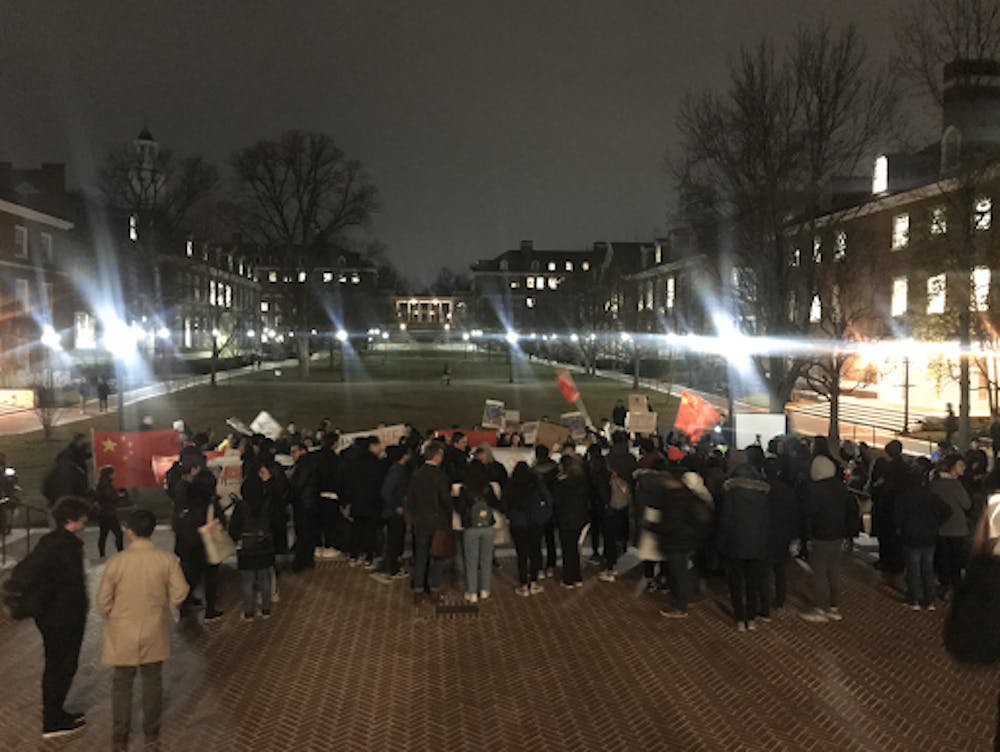I didn’t expect to witness a death threat upon entering the auditorium at the Foreign Affairs Symposium (FAS) event featuring the Hong Kong Umbrella Movement activists, Nathan Law and Joshua Wong.
But perhaps I needed to see the threat. In his essay On Liberty, philosopher John Stuart Mill justifies the need for considering oppositional viewpoints. Mill claims that “he who knows only his own side of the case knows little of that.... If he is equally unable to refute the reasons on the opposite side... he has no ground for preferring either opinion.”
Mill argues that truth is truth not because it is blindly and dogmatically repeated, but rather, because of its ability to be tested repeatedly against arguments that tear it apart. Complementarily, the Chinese proverb, “瑕不掩瑜” (“scratches and flaws cannot steal away the beauty of the jade”) declares that any diminution of fundamental truths — such as the beauty and value of the jade in Chinese culture — still cannot extinguish the truth.
Entering the auditorium for Law and Wong’s presentation, I saw four students holding up the threat on a banner: “港獨死路, 回頭是岸”. A non-Chinese speaker asked one of the students for a translation. I offered mine: “Hong Kong: Your independence is a road leading you to death; turning back will bring you to shore.”
I explained that “death” — the circled red word on the banner — is essentially a curse word in Chinese. Generally, Chinese people do not believe in hope or life after death, and so they are, well, deathly afraid of death. Sometimes, the elevator button for the fourth floor is blank because the Chinese word for “four” sounds similar to “death.” Yes: “Death” is that taboo in Chinese.
However, one of the Chinese students immediately refuted my translation, continuously interrupting me. He claimed that the red word wasn’t actually the word for “death.” He then offered that their banner was simply a “suggestion,” and that oh no, it’s not a death threat whatsoever! Not at all! We love Hong Kong!
Following such a cowardly and deceptive response, I watched Chinese students systematically leave their seats in spaced-out intervals during Law and Wong’s talk. The Chinese students gathered in the back of the auditorium with aggressively sinister signs, meticulously unified.
My dear protesters: Law and Wong weren’t even addressing Hong Kong independence, which is much of what you were protesting against. They were discussing Hong Kong citizens’ right to peacefully protest, which unfortunately led to inhumane authoritarian restraint.
I tried to understand why anyone would deliberately antagonize the speakers like the Chinese students did on that night two weeks ago. If I was raised under a certain governmental system, and the system benefited me my whole life, I would believe in its power too. Anything threatening the status quo, as the Hong Kong protests do, would have repulsed me.
Humans are emotional beings: People will feel what they feel no matter what. People should have the space to express those feelings. Of course, those feelings only do so much. That night, the speakers still spoke. The protesters still protested. The audience still asked questions (or some more so interrogated). Yet, in response to these actions, the speakers kept speaking. Perhaps Mill wasn’t so wrong after all: If the truth was meant to stand, regardless of how many times it was forced to fall, it would get back up again. Freedom of speech allows for the freedom to know the truth, and the truth is greater than the fear or initial shock of conceptualizing it. Freedom of speech can exist even at the expense of hate speech.
The Chinese government should have responded to the Hong Kong protesters similarly to how Law and Wong handled the Chinese student protesters at Hopkins. The Hong Kong protests were a necessary natural response to large unexplained changes.
Assuming that the Hong Kong protesters were hypothetically not justified in protesting, I will consider two cases: that the Hong Kong protestors either were or were not responsible for the police and government violence.
First, if the citizens were not at fault for the violence in Hong Kong, then the movement would have eventually faded out, and thus the protests should have been allowed. On the other hand, if the citizens were at fault for the violence, then there must have been underlying issues that needed to be understood, rather than simply silenced.
Additionally, the protests themselves would have been terrible for the local economy and quality of life, and so the protesters’ self-destruction would have naturally caused consequences. Thus, in this case, the protests also should have been allowed.
I am now left with a final case in which the Hong Kong protesters were justified in protesting. Clearly, in the face of injustice, tyranny and false promises, the Hong Kong protesters had every right to demand justice.
Thus, in any case, the Hong Kong protesters had the right to protest, which would have led to either no harm or deserved, self-caused consequences. The Chinese government’s violent reaction clearly demonstrates a fear of people expressing their feelings, a fear of people making noise, a fear of a freedom of speech. This fear would not exist if there was no corruption in the Chinese government for the people to expose.
Law and Wong needed to visit our University. It sparked conversation within the Chinese community, exposing the necessity for freedom of expression, speech and protest — even for other Chinese speakers. Sure, there was significant opposition, and it wasn’t perfect and pretty.
But that isn’t the point; it never is. The point was that a dialogue, however small, between two completely opposing viewpoints, existed. Here’s to many more to come.
In terms of leaders and civil rights leaders, there are so few Asian and Asian American role models. Our cultures and societies expect us to be deferent and keep our heads down. But it’s time we saw Asian role models value long term integrity over momentary harmony. It’s time someone spoke out. It’s time someone was unafraid to take a stance. It’s time that someone was unafraid to speak.
As the FAS event drew to a close, as the student protestors became hauntingly louder with their numerous death threats and signs, Nathan Law, microphone in hand, cut through the noise. He mentioned how grateful he was that there was a democracy, a democracy allowing a space for the protests to be discussed, the protest both in Hong Kong and right before his eyes, in Shriver Hall at The Johns Hopkins University, in which the building’s roof is artfully decorated with the University motto, “The truth will set you free.”
We must heed his words. We must make sure that truth always can set us free.
Keidai Lee is a transfer sophomore studying Computer Science and Philosophy from Rochester, N.Y.





